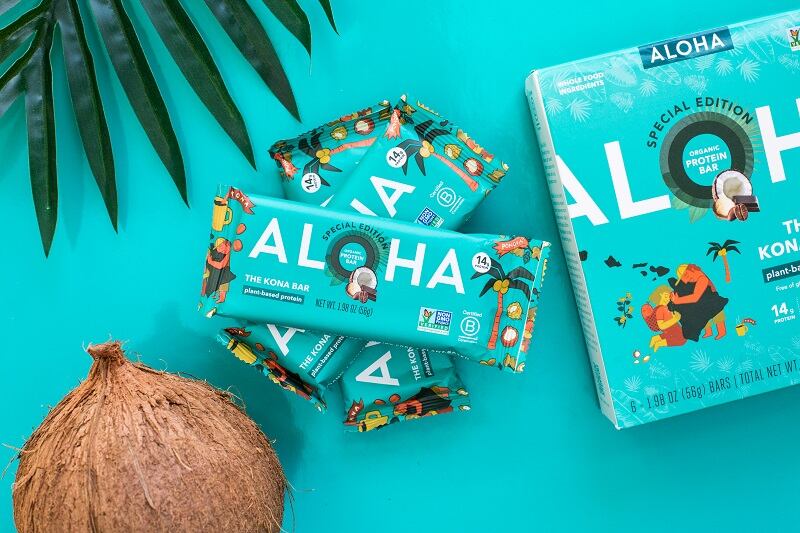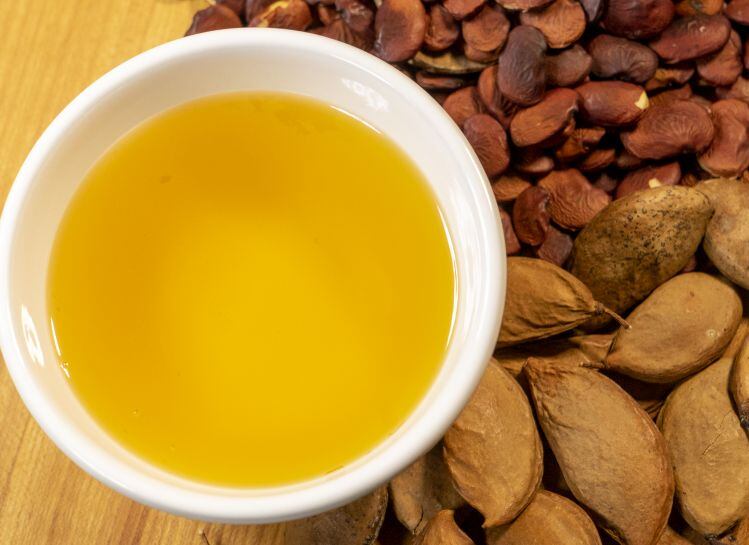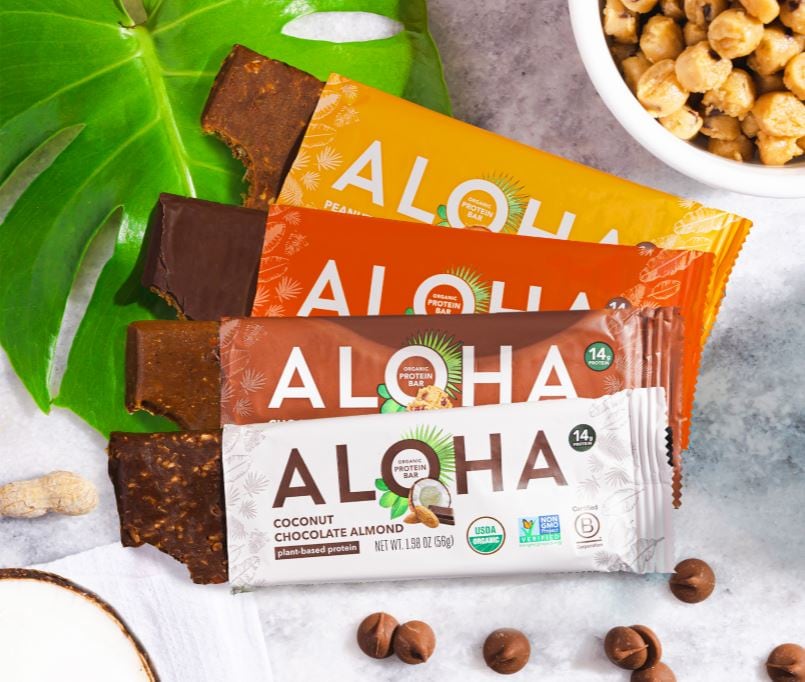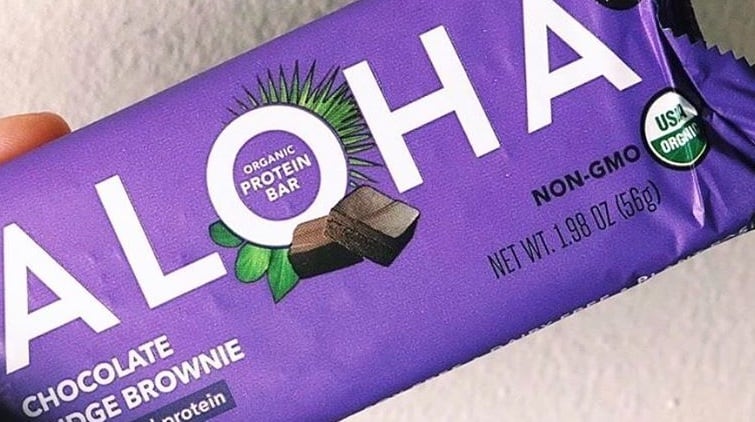Aloha’s Kona Bar, available online at the company’s website and Thrive market beginning today while supplies last, blends a trio of “responsibly-sourced ingredients” from Hawai‘i including 100% Kona Coffee, 100% Hawai‘i-grown macadamia nuts and Ponova oil from climate-resilient pongamia trees on O‘ahu.
“This has been a passion project of mine that requires a business and a brand to be of a certain size to sustain something as heavily intensive in terms of time and effort” to source ingredients and craft a product that can fairly pay homage to “the beautiful, holistic ecosystem of Hawai‘i, including the land, earth, people, community and spirit,” as well as the regenerative agriculture movement on the islands that uses “the bounty and goodness of the land to serve others and sustain ourselves,” Aloha CEO Brad Charron told FoodNavigator-USA.
He explained that as a proudly certified B-Corp, Aloha also wanted to use its business as a force for good by donating 10% of proceeds from every Kona Bar sold to the non-profit Kupu, which provides hands-on land stewardship education to youth in Hawai‘i.
Healing the land with a ‘regenerative agriculture powerhouse’
The inspiration to include Kona Coffee, Hawai‘i-grown macadamia nuts and Ponova oil came to Charron while he was driving alongside the islands’ volcanoes and saw the environmental and economic destitution caused in part by a once flourishing but since abandoned sugar cane industry in the region.
Upon learning how Terviva is working to heal this degraded land and economy by planting pongamia trees and develop from them ingredients, including Ponova oil, that are “holistically better” for the planet, people and broader community, Charron said he knew he wanted to partner with the “regenerative agriculture powerhouse.”
He also acknowledged the difficulty of creating new ingredients, building supply chains and ushering in new commercial production, and wanted to help spread the word about the benefits of Ponova oil, which it calls out on the packaging of the Kona Bar as well as the product’s landing page along with the value of other key ingredients in the bar.
What is Ponova oil?
Ponova oil’s long-awaited debut in a commercial food product comes months ahead of its mid-2023 target date, but 12 years after Terviva began planting and innovating around pongamia trees, which company CEO Naveen Sikka described as a cross between soy and palm but with only the best attributes of each.
“Two of the largest five crops in the world are soybean and palm. Palm produces lots of oil, which is why it is the dominate edible oil in the market, and soybean produces both oil and protein, and is actually the dominate form of plant protein on the market. So, I like to say is that if soybean and palm had a baby for the modern world it would be pongamia because pongamia makes as much oil as palm does and more protein than soy and because it is a tree that can grow on degraded land, we can also sink carbon and sell carbon credits as well,” Sikka said.
He explained that he opted to plant pongamia in Hawai‘i after discovering that the hundreds of thousands of acres once dedicated to sugarcane production no longer were used for the crop – costing many farmers “everything.”
“Generationally we see cropland come out of production at massive scale because of some environmental factor or market factor, so in 2012 I started coming to Hawai‘i and noticed the pongamia tree already grew there, but that we had better varieties that would yield more even on poor quality land.
“We started planting before we figured out how to make it into a food ingredient,” but with years of research, more than $100m in capital raised, and “fantastic partners” the company found a way to naturally process the beans to create Ponova oil as well as flour and protein, said Sikka.
“It is a really fantastic culinary oil. It has got a beautiful golden color as we did very minimal processing. It’s go beautiful cooking attributes. It’s got a high smoke point. It’s rich in omega-9, about 55% omega-9, which is a very desired, healthy fat in foods. And it is versatile,” Sikka added.
Consumer education is essential for scaling regenerative agriculture
By partnering with Aloha, Sikka said Ponova not only has a chance to shine as a new ingredient with in-demand macros and cooking attributes but also to help “write a story about the future of our planet, regenerating farmland, restoring communities, sinking carbon and making our planet more climate durable” because these are all values both companies share.
Charron also noted that by introducing The Kona Bar as a limited edition consumers’ curiosity will naturally piqued – giving the duo a better opportunity to share the value proposition of the star ingredients.
“We have a great audience that is very informed and we get a lot of questions about our ingredients, including where do they come from? Why are using them? And we have really thoughtful answers,” that will be detailed on Aloha’s website but also on Thrive Market, which is an exclusive partner for the launch, Charron said.
The packaging too helps tell the story, he said, noting it was designed by a Honolulu based artist who incorporated flags on the front of pack that call out images of the key ingredients, including Ponova oil.
Scaling production of Ponova oil
As awareness grows, Sikka hopes demand for Ponova oil will also grow so that Terviva can plant “millions of trees to help billions of people.”
He explained that he has a strong supply that Terviva to support this launch and is continuing to scale so that now through mid-2024 he has enough Ponova oil for sampling to work with other B2C brands. As they innovate together, the company will bring more Ponova to market in the following 18-24 months with a longer range goal of offering thousands of tons within 30 to 36 months.
Aloha on track to become Certified Climate Neutral
As for Aloha, the current collaboration with Terviva brings it one step closer to its ultimate goal of becoming a Certified Climate Neutral company later this year.
“I am not aware of any other plant-based protein brand that has obtained this certification, but I’d love to be the first … to show people that they can do it” and become a force for positive change in the overall food ecosystem, while also producing products that are delicious, nutritious and which consumers want, Charron said.




